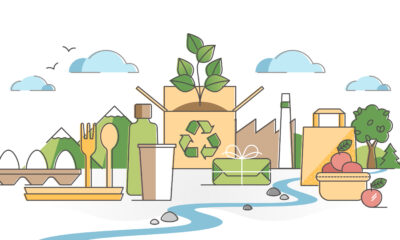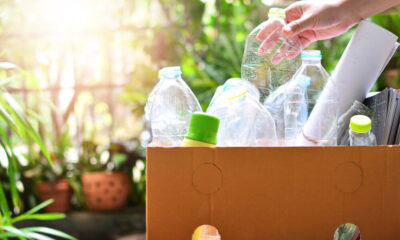

Environment
6 Tips to Achieve Waste Reduction During a Camping or Fishing Trip
There’s nothing quite like camping out under the wide-open sky, miles from the nearest neon sign. Of course, if we want such pristine places to remain all but untouched after we’re gone, we have to make some sacrifices. Camping, hunting and fishing trips are all intertwined, and we should respect the natural world around us during whatever excursion you might be undertaking.
As you look for cool camping gear to keep you safe and comfortable on our trip, start thinking about accessories and supplies that limit your camping hobby’s adverse impacts on the natural world. Virtually every camper can follow these six impact-reducing tips. Some are common sense, others may be obligatory, and still others are simple to implement.
1. Pack Everything Out
This is one of the guiding principles of low-impact camping. Packing out artificial materials like plastic wrappers and bottles is common sense, but the mere fact that food scraps can biodegrade doesn’t make them any less disruptive to the natural environment. Just look at the prevalence of bears and raccoons at campsites across North America. Packing out your materials is essential to your safety – to other animals around you. Biodegradable toilet paper can help, but be sure to pick up anything such as aluminum foil for cooking and other waste before you leave the area.
Follow a simple rule: If you bring it in, bring it out.
2. Avoid Water-Hogging Flush Toilets
This won’t be a problem at backcountry campsites. Outhouses and even buckets, as “disgusting” as that might sound, greatly help reduce your impact on the nature environment. At modern sites, it’s a different story. No matter how well-engineered they are, flush toilets require extensive plumbing infrastructure that adversely impacts the natural environment. Look for sites with drop toilets or composting toilets, both of which are less likely to harm local groundwater. Though neither is foolproof, it’s a great way to leave things as they were.
3. Skip the Shower
Gross? Maybe. But not as gross as disgorging soapy water into streams, lakes, and groundwater near your campsite. If you’re planning an extended hike, look for opportunities to shower amid civilization — for instance, dip off the trail and stay at a hotel one night. Or use clean sources of surface water to bathe without soap. Imagine if you (or a bear or a squirrel) wants to take a nice clean drink from a spring-fed stream – and instead you get a nice mouthful of dirty soapy shower water from the previous tenant?
4. Stay on Marked Trails
Every step off a marked trail is life-threatening — at least, for flora and micro-fauna nearby. Some environments are particularly sensitive to wandering footfalls: alpine biomes, for instance, are notoriously fragile. But sticking on the trail is a good practice even in the most robust habitats. How would you feel if someone trashed your home? Just as you respect your neighbors in an urban setting, think about off-trail hiking as a “home invasion.”
5. Practice Fire Safety
Smokey the Bear said it best “First and foremost, observe all posted fire policies. We live and die by fire. If conditions are too dry for safe burning under any circumstances, don’t start a fire. You don’t want to be the one responsible for an out-of-control conflagration that threatens homes, businesses, lives, and habitats.
Assuming burning is permitted around your campsite, make sure you’re observing all fire safety best practices. Use the double-douse method of extinguishing: thoroughly douse the fire, wait until only steam is visible, and douse again until the entire pit is cool to the touch.
6. Take Only Pictures
We all love souvenirs, but even the most innocuous removals — a leaf here, a stone there — can adversely impact the natural world. Sure, you might be out on a fishing or hunting trip — but even then, stick to the plan, throw back the smaller fish and leave the other little guys alone so they can reproduce. Pictures make for better memories than physical artifacts, anyway. If you’re really worried about remembering your experience, invest in a better camera.
Do Better by the Outdoors
Humanity only has one home. It’s our duty to protect it, even when doing so isn’t the easiest or most convenient choice. If we really want those who come after us — our children, grandchildren and beyond — to have the same transcendent outdoor experiences as we do, there’s no higher calling. We’ve lived on Industrial Revolution standards and thinking for far too long. It’s time we realized that other living beings share our home called Planet Earth.
Let’s respect living beings who are not us. Let’s do our part.


 Environment12 months ago
Environment12 months agoAre Polymer Banknotes: an Eco-Friendly Trend or a Groundswell?

 Features11 months ago
Features11 months agoEco-Friendly Cryptocurrencies: Sustainable Investment Choices

 Features12 months ago
Features12 months agoEco-Friendly Crypto Traders Must Find the Right Exchange

 Energy11 months ago
Energy11 months agoThe Growing Role of Solar Panels in Ireland’s Energy Future




























